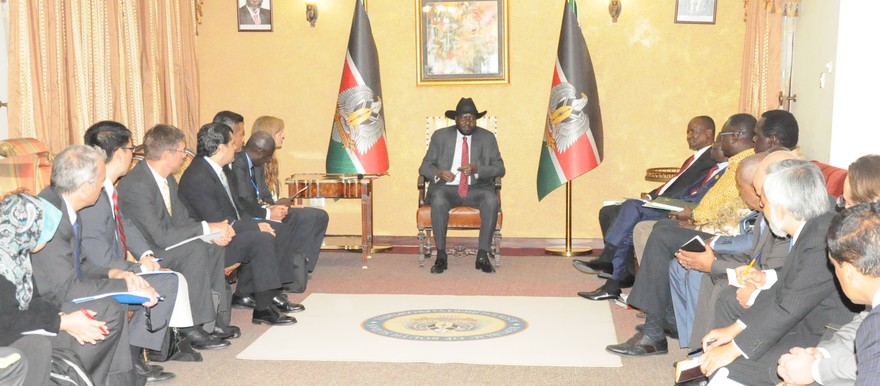A UN panel of experts has concluded that heavy fighting that engulfed South Sudan’s capital Juba in July, forcing vice president and ex-rebel leader Riek Machar to flee, was “directed by the highest level” of the country’s military.
News agency AFP, which received a copy of the report before its public release, says that the report points the finger at President Salva Kiir and army chief of staff Paul Malong as having ordered the large-scale attacks that began on July 8.
“The relatively large scale of the hostilities which featured the deployment of MI-24 attack helicopters, in coordination with ground forces, reinforced by armed units, support the conclusion that the fighting was directed by the highest level of the SPLA command structure,” said the report.
In the report, the experts quoted South Sudanese officers as saying that only Kiir and Malong have the authority to order the attack helicopters into combat and that Malong acted “with Kiir’s full knowledge” during the offensive.
The finding dismissed suggestions that the violence in Juba, which led to the collapse of a fragile unity government cobbled together from a year-old peace deal, was carried out by rogue elements.
Hundreds died in the four days of fighting last July, with medical sources reporting 271 reported dead on the first day alone and hundreds more killed in following days. The full death toll is not known but a medical source at Juba Military Hospital later told Radio Tamazuj the toll for the combatants alone was about 600.
Tens of thousands more people have fled the country since the fighting, and the United Nations reported a surge in sexual violence, allegedly perpetrated by government soldiers against ethnic Nuer women and girls.
The two-and-a-half year conflict has escalated from a “primarily political to a tribal war,” said the report.
Attack on aid workers ‘well-coordinated’
The panel found that dozens of soldiers gang-raped and beat aid workers in a “well-coordinated attack” on a Juba housing compound on July 11.
Over four hours, between 80 and 100 soldiers overran the Terrain compound, beat and abused, raped and gang-raped at least five international aid workers and executed an employee of a non-governmental organization.
“The soldiers damaged every single room, and looted the compound extensively, taking over 25 vehicles,” the panel said.
“Considering the degree of violence inflicted, the high number of armed actors who participated, the vast quantity of items stolen and the systematic damage exacted on the sprawling compound, the panel has concluded that this attack was well coordinated and cannot be considered as an opportunistic act of violence and robbery,” it added.
The panel described the attack as a “clear turning point in the level brutality inflicted by South Sudanese soldiers on international humanitarian personnel,” it added.
A separate UN investigation has been established to report on whether UN peacekeepers failed to protect civilians including the aid workers at the Terrain compound who sent several text messages to the UN mission pleading for help.
The experts said arms sales to South Sudan’s military were continuing, citing the recent purchase of two L-39 jet fighters, one of which was used in combat operations in July.
Kiir’s government has entered into contact with a Lebanese-registered firm, Rawmatimpex, to build a small arms manufacturing plant in South Sudan, but the outcome of those talks are unclear, according to the panel.
South Sudan descended into war in December 2013 when Kiir accused Machar of plotting a coup.
(Radio Tamazuj, afp)
Photo: President Salva Kiir receives a delegation of UN Security Council diplomats who pledged their support for his government, 4 September 2016




